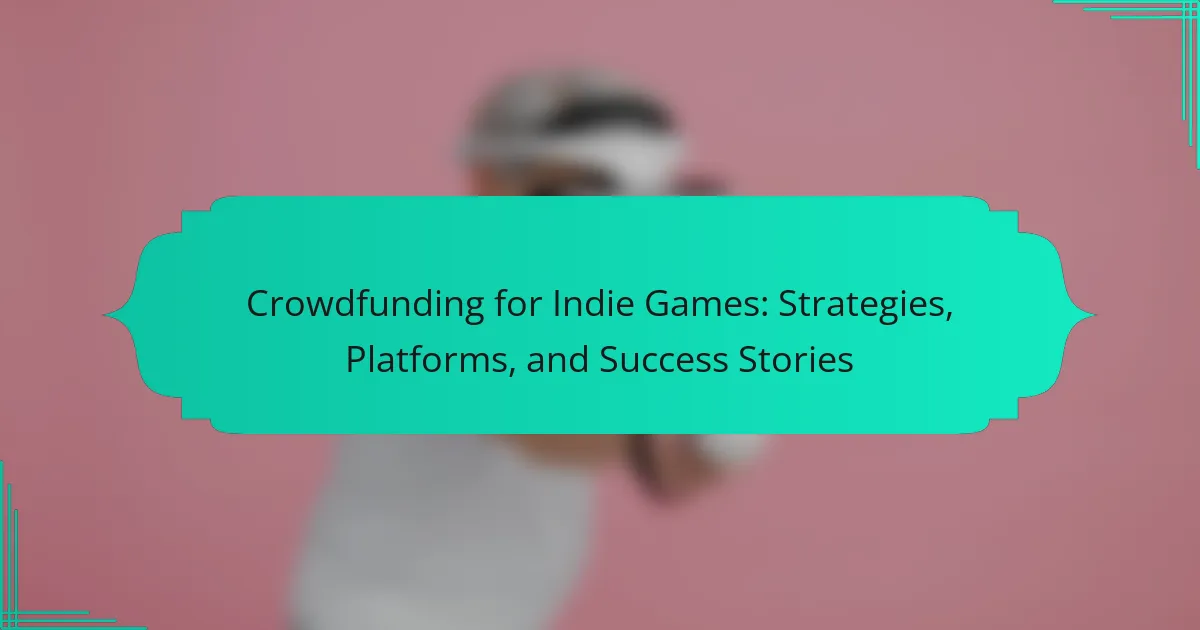Crowdfunding for indie games offers developers a pathway to secure funding and build a dedicated community. Key strategies include setting clear goals, crafting engaging narratives, and leveraging platforms like Kickstarter and Indiegogo. Successful campaigns demonstrate innovative marketing techniques and strong community engagement. Notable success stories highlight the impact of unique game attributes and effective communication with backers.
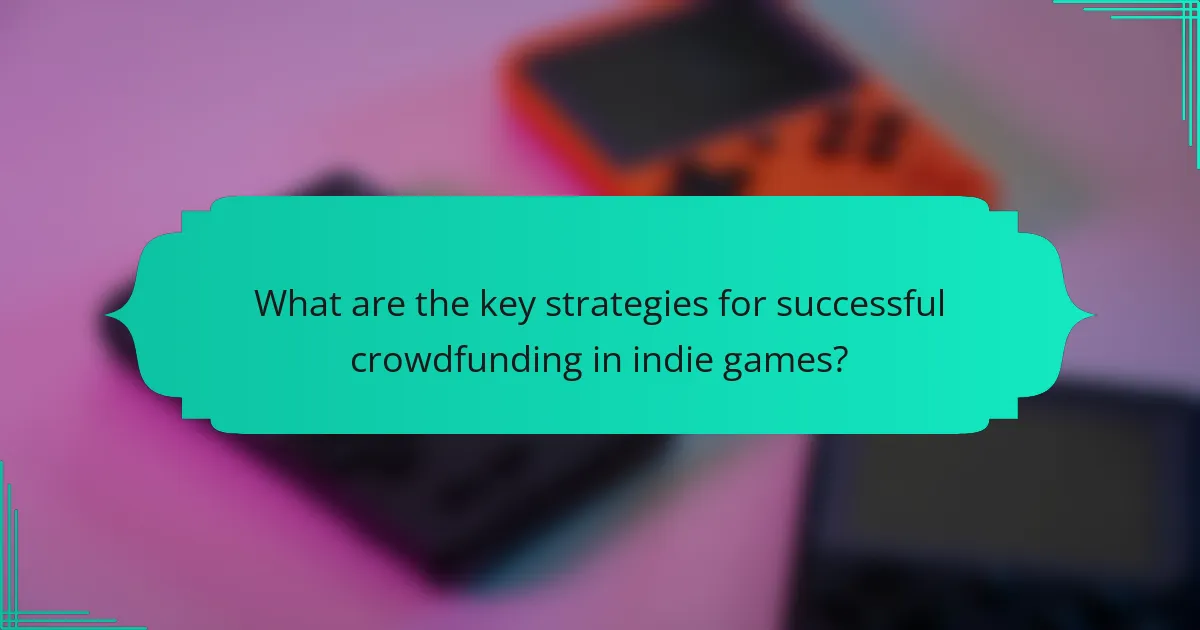
What are the key strategies for successful crowdfunding in indie games?
Successful crowdfunding for indie games requires clear goals, engaging storytelling, and an active community. Focus on building a strong pitch that highlights unique attributes of the game, such as innovative gameplay or artistic style. Utilize platforms like Kickstarter and Indiegogo, which cater specifically to creative projects. Regular updates and transparent communication with backers are essential to maintain interest and trust throughout the campaign.
How do storytelling and presentation impact crowdfunding success?
Storytelling and presentation significantly enhance crowdfunding success by engaging potential backers emotionally. Compelling narratives create a connection, making projects relatable and memorable. High-quality visuals and professional presentations establish credibility and professionalism, increasing trust. Successful campaigns often feature clear, authentic stories that highlight the game’s unique attributes and development journey.
What role does community engagement play in crowdfunding campaigns?
Community engagement is crucial for crowdfunding campaigns as it fosters trust and builds a loyal supporter base. Engaging with potential backers through updates, feedback, and community events enhances visibility and encourages sharing. This interaction can lead to a more significant funding outcome, as backers feel connected to the project and its creators. Successful indie game campaigns often highlight their community involvement, showcasing how active participation can drive funding success and create lasting relationships.
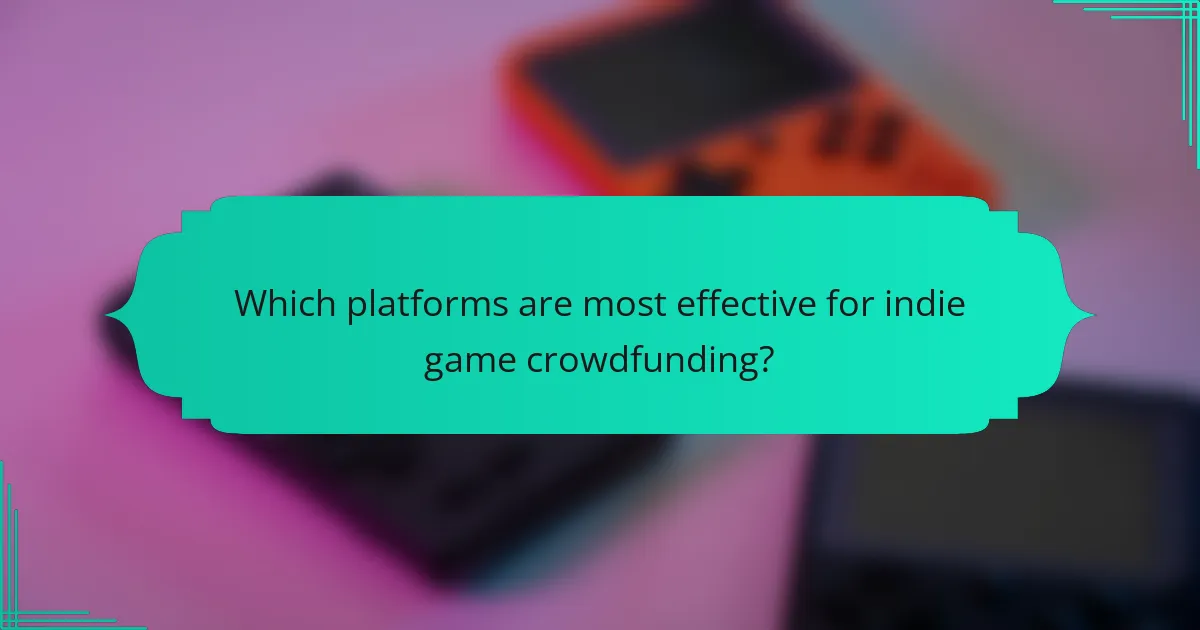
Which platforms are most effective for indie game crowdfunding?
Kickstarter and Indiegogo are the most effective platforms for indie game crowdfunding. Kickstarter offers a large community and proven success rates, while Indiegogo provides flexible funding options. Both platforms cater specifically to creative projects, making them ideal for indie game developers. Additionally, platforms like Fig and Gamefound focus exclusively on games, providing tailored support and resources for creators.
How do platform features influence campaign outcomes?
Platform features significantly impact campaign outcomes by influencing visibility, engagement, and funding success. Key features include user interface design, social sharing options, and reward structures. A well-designed platform enhances user experience, encouraging backers to contribute. Social sharing tools amplify reach, allowing campaigns to attract a broader audience. Unique reward structures can motivate higher funding levels by appealing to diverse backer preferences. For instance, platforms like Kickstarter and Indiegogo offer varying degrees of customization, affecting how effectively campaigns can connect with potential supporters.
What are the differences between regional crowdfunding platforms?
Regional crowdfunding platforms differ primarily in their target audiences, funding models, and regulatory environments. Platforms may cater to specific geographic locations, influencing project visibility and backer engagement. For instance, platforms focused on North America may emphasize rewards-based funding, while European platforms might incorporate equity crowdfunding. Additionally, local regulations can affect legal compliance and financial reporting, impacting project feasibility. Understanding these differences helps indie game developers choose the most suitable platform for their needs.
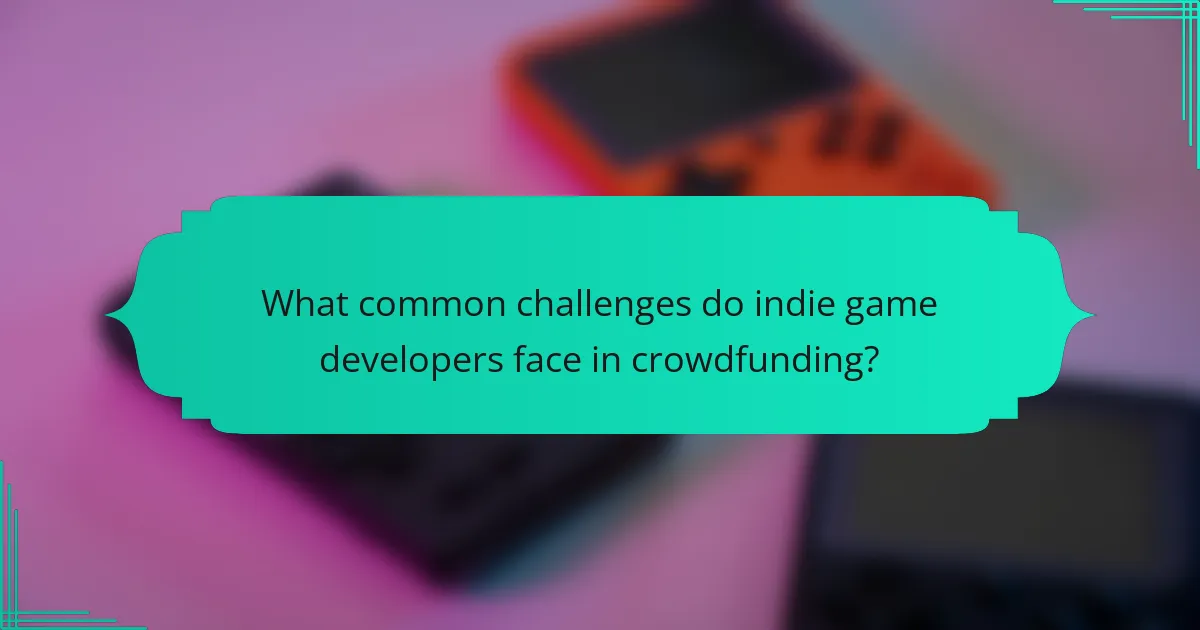
What common challenges do indie game developers face in crowdfunding?
Indie game developers often face challenges such as limited funding, marketing difficulties, and maintaining community engagement during crowdfunding. These obstacles can hinder their ability to reach financial goals and attract backers.
Limited funds restrict the scope of game development, making it hard to deliver high-quality products. Marketing challenges arise from the saturated gaming market, where standing out is essential for success. Additionally, sustaining community interest throughout the campaign is crucial; losing momentum can lead to funding shortfalls.
To overcome these challenges, developers should create compelling narratives around their projects, engage with potential backers early, and utilize social media effectively. Building a strong community can enhance credibility and encourage support.
How can developers overcome funding shortfalls?
Developers can overcome funding shortfalls by leveraging crowdfunding platforms to secure financial support. Successful strategies include creating compelling narratives, engaging visuals, and offering enticing rewards. Platforms like Kickstarter and Indiegogo have empowered indie developers to connect directly with potential backers, fostering community investment in unique game concepts. Notable success stories, such as “Shovel Knight,” illustrate how effective crowdfunding can lead to not only funding but also a dedicated fan base.
What are the implications of campaign timing and market trends?
Campaign timing and market trends significantly influence crowdfunding success for indie games. Launching during peak gaming events or aligning with market trends can enhance visibility and funding potential. For instance, campaigns launched during major gaming conventions often attract more backers due to heightened interest. Additionally, understanding current gaming trends, such as popular genres or themes, allows creators to tailor their projects for better reception. Seasonal trends, like holiday shopping periods, also present opportunities for increased funding. Overall, strategic timing aligned with market dynamics can lead to successful crowdfunding outcomes.
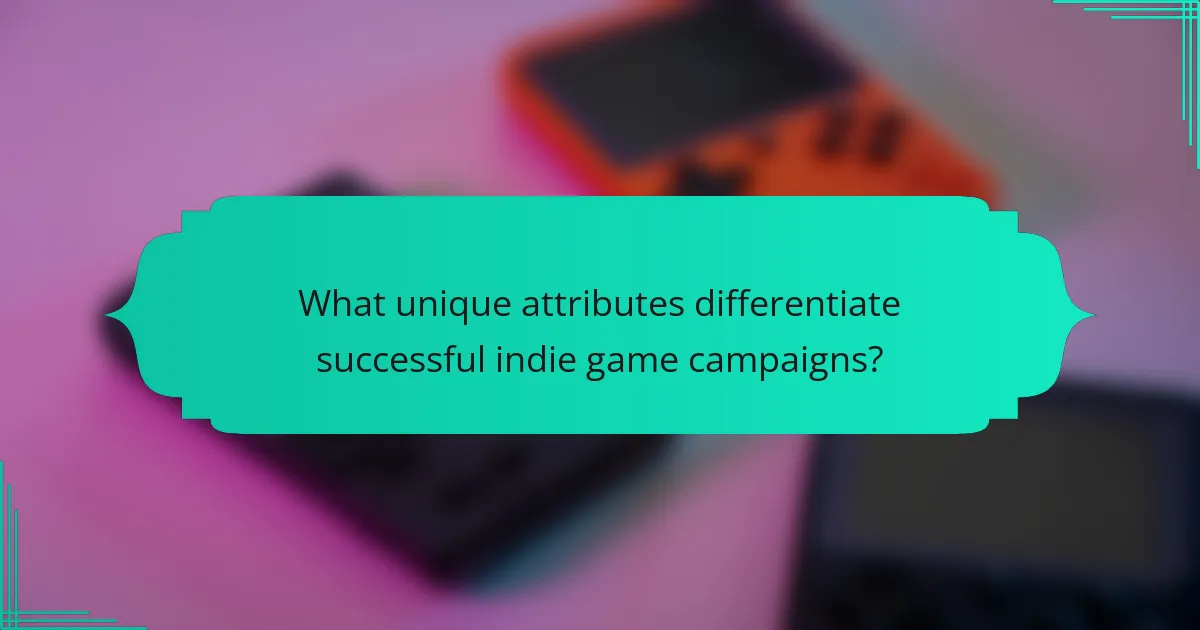
What unique attributes differentiate successful indie game campaigns?
Successful indie game campaigns often stand out due to unique attributes like strong community engagement, innovative marketing strategies, and a compelling narrative. These elements foster a loyal backer base and create excitement around the project.
Community engagement is crucial; campaigns that actively involve their audience through updates and feedback tend to succeed. Innovative marketing strategies, such as leveraging social media and influencer partnerships, can significantly boost visibility. A compelling narrative that connects emotionally with potential backers also enhances a campaign’s appeal.
Additionally, offering unique rewards tailored to the target audience can differentiate a campaign. For instance, exclusive in-game items or behind-the-scenes access can create a sense of value.
Lastly, a clear vision and roadmap for the game’s development reassures backers about the project’s viability, enhancing trust and investment.
How does the game genre affect crowdfunding strategies?
The game genre significantly influences crowdfunding strategies by shaping target audiences and marketing approaches. Different genres attract distinct backers, impacting funding goals and campaign messaging.
For instance, strategy games often appeal to niche audiences, requiring tailored outreach through community engagement and genre-specific platforms. In contrast, action games may leverage broader appeal, utilizing social media and influencer partnerships to maximize visibility.
Additionally, the success stories of crowdfunding campaigns reveal that genre-specific rewards and stretch goals resonate more effectively with potential backers, enhancing overall funding success. Understanding these dynamics allows creators to optimize their strategies according to genre characteristics.
What innovative funding models are emerging in the indie game space?
Innovative funding models in the indie game space include crowdfunding strategies that leverage platforms like Kickstarter and Indiegogo. These platforms allow developers to engage directly with their audience, securing financial support while building a community. Success stories highlight campaigns that exceeded funding goals, showcasing the potential of pre-sales and fan investment. Additionally, alternative models like equity crowdfunding and subscription services are emerging, providing diverse revenue streams for indie developers.
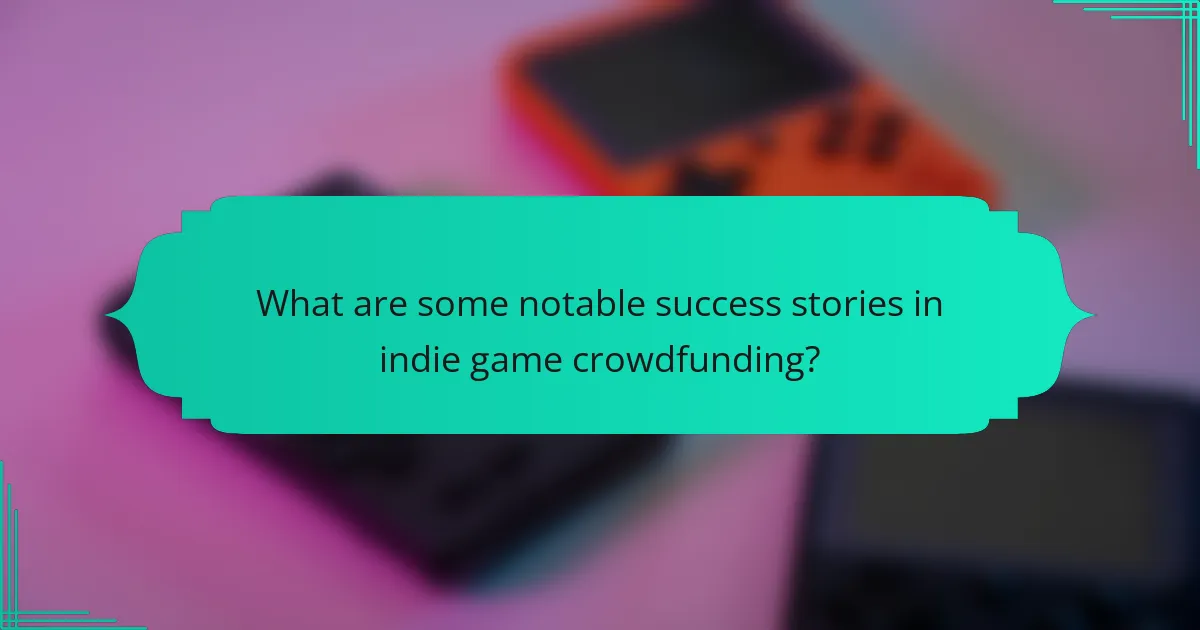
What are some notable success stories in indie game crowdfunding?
Notable success stories in indie game crowdfunding include “Undertale,” which raised over $50,000, and “Hollow Knight,” which garnered nearly $58,000. “Shovel Knight” also stands out, achieving over $300,000. These games exemplify effective strategies and community engagement. Each success showcases unique attributes, such as innovative gameplay and strong narratives, which resonate with backers.
How did specific campaigns achieve their funding goals?
Successful campaigns for indie games achieved funding goals through targeted marketing, community engagement, and compelling storytelling. Campaigns like “Shovel Knight” and “Filling the Void” utilized social media platforms to build anticipation and maintain backer interest. They also offered unique rewards, such as exclusive content and early access, which motivated higher pledges. Additionally, leveraging platforms like Kickstarter and Indiegogo allowed creators to tap into established communities, enhancing visibility and trust. These strategies collectively resulted in exceeding initial funding targets and fostering loyal fan bases.
What lessons can be learned from failed crowdfunding attempts?
Failed crowdfunding attempts provide valuable lessons for future campaigns. Key takeaways include the importance of thorough market research, clear communication of project goals, and realistic funding targets. Engaging with potential backers early can build trust and community support. Additionally, analyzing why certain projects failed can reveal common pitfalls, such as inadequate marketing strategies or lack of updates, which are critical for maintaining backer interest.
What best practices should indie developers follow for crowdfunding success?
Indie developers should focus on clear communication, engaging storytelling, and community building for crowdfunding success. Establish a compelling narrative around the game, showcasing its unique attributes and vision. Utilize platforms like Kickstarter and Indiegogo, which cater specifically to indie projects. Regular updates and transparent interactions with backers foster trust and enthusiasm. Successful campaigns often include attractive rewards and stretch goals to incentivize funding.
